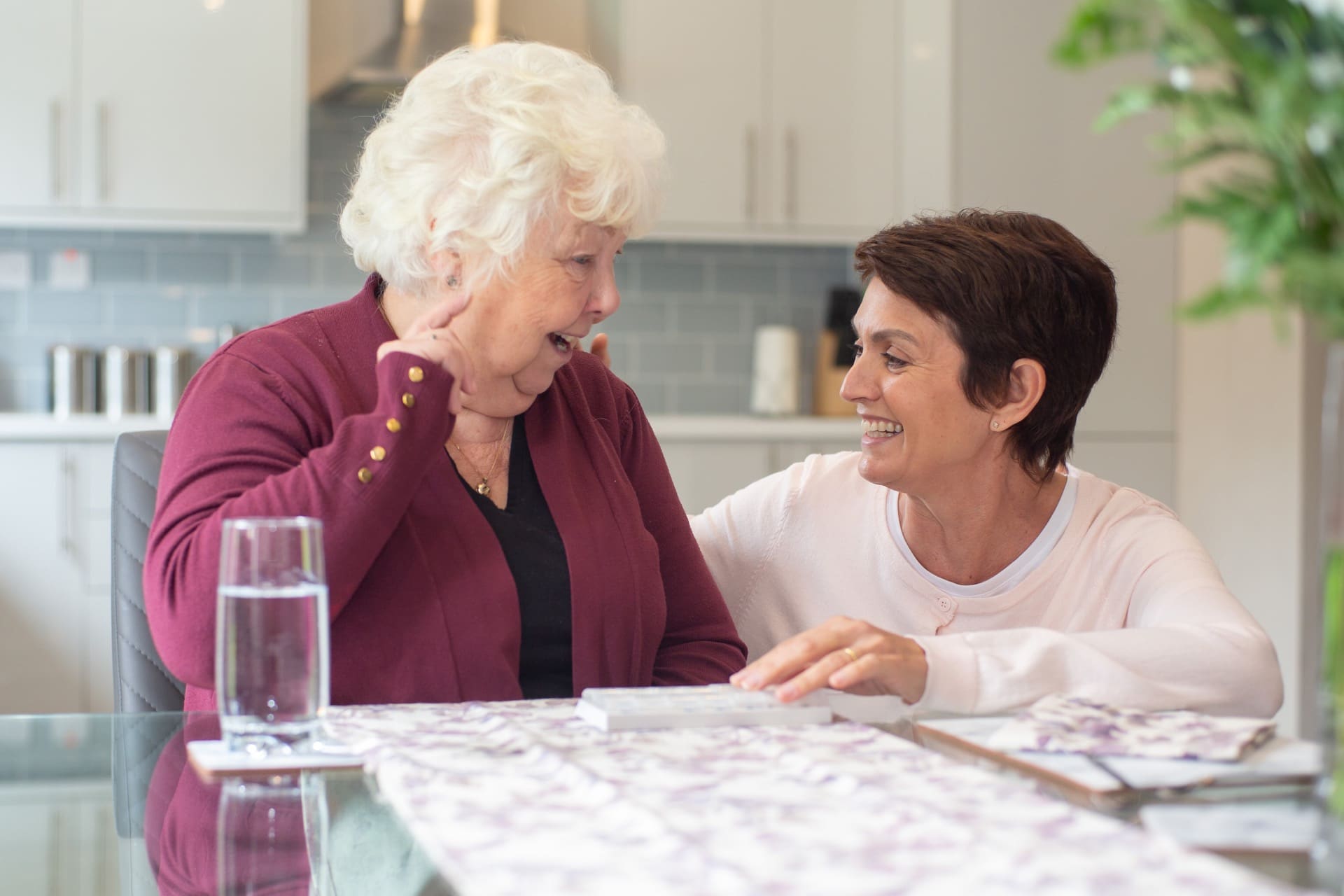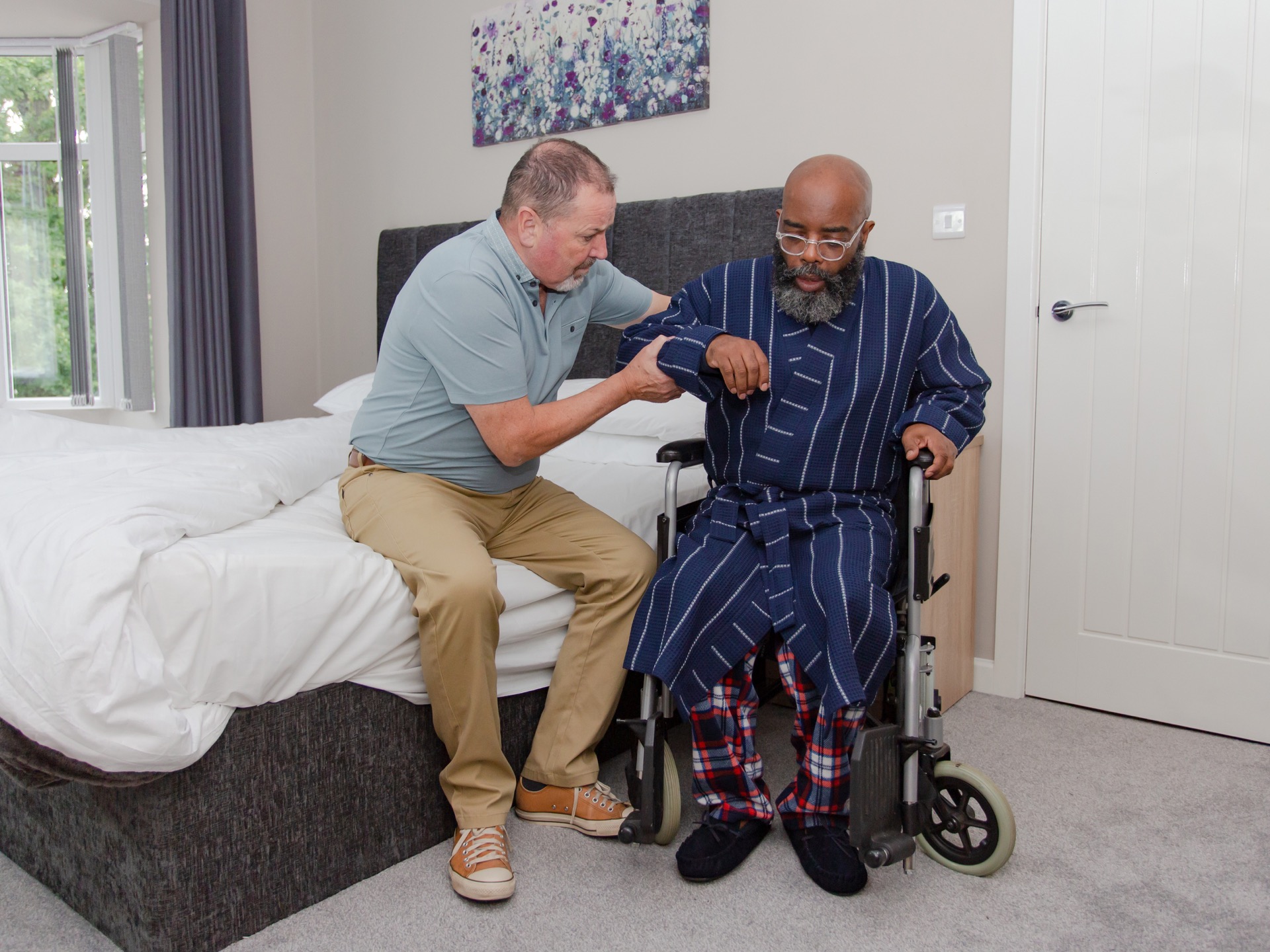Live in care for dementia
Get dementia live in care at home
When you or a loved one have received a dementia diagnosis, it can be a difficult time for you all. You probably have lots of questions and are perhaps unsure whether you’ll be able to stay living in your beloved home. With live-in dementia care from Helping Hands, you can rest assured that you’ll never have to leave the comfort and familiarity of your own home in order to get the right care.
Whether you need 24-hour care whilst you are in the latter stages of Alzheimer’s, or you want extra peace of mind that someone will be there to help you go about your daily activities – live-in care allows you to have the freedom and flexibility of always having someone on hand throughout the day and night, should you need them.
Support from expert dementia carers

Every Helping Hands carer receives comprehensive dementia training.
All of our live-in carers receive detailed dementia training as part of our award-winning training programme so that they will be able to provide the support and reassurance that you need when living with the condition. What’s more, we’ll make sure that your live-in carer matches you in both experience and personality – so if you have vascular dementia and require help with personal care but also have a particular love for football, we’ll work with you to find a carer that is able to help with your practical needs, but is happy to accompany you to cheer on your favourite team.
How can live in care help those with dementia?
If you or a loved one have received a dementia diagnosis, it’s likely you’re looking for a stable, reliable support option that will provide you with proactive and compassionate help. A live-in carer gives your loved one a consistent, friendly source of help that they can be truly comfortable with.
Their live-in carer will know which elements they need help with and what they prefer to do for themselves. They’ll also help your loved one to remember things that are important to them – for instance, they may have shared an afternoon together in your loved one’s childhood town and need gentle prompts to remember the people they met and the activities they took part in.

A live-in carer can help those living with dementia with:
Tailored care plans
As dementia home care specialists, we recognise how important it is to maintain a routine and to keep disruption to a minimum for anyone that is living with the condition. That’s why we’ll work with you and your loved ones to create a tailored care plan that fits in with your life and personal preferences, whilst also making sure you get the very best care.
Care in your own home
Live-in care also means that you can stay in the comfort of your own home without the stress and upheaval of moving into residential care, where you may be further away from your family than you would like. One of the challenges of dementia is confusion and disorientation, so it makes sense that you surround yourself with an environment that you are familiar with, which is what live-in care within your home can offer you.
One-to-one care from the same carer
Having the same carer provides you with consistency of care and someone that you can get to know and build a rapport with. Having one-to-one care from the same person instead of a variety of different carers that you might have in a nursing home, means that you create a mutual trust and understanding for one another.
Transition to palliative care
For those that are in the advanced stages of dementia, live-in care may evolve into palliative care. With a carer in place that is already familiar with you, your routine and your loved ones, this transition can be made in a dignified and seamless way, ensuring your wishes are carried out the way you would like and you feel comfortable and cared for.
Continue with hobbies and social activities
Many of our customers who have live-in dementia care find that their carer becomes more like a friend or an extended member of the family. Not only is a carer there to support you with the practicalities, they can help you to maintain your independence and the hobbies you love. So, instead of worrying about getting lost when trying to find your favourite café, your carer can accompany you so that you can enjoy some fresh air and a change of scenery.
Support with housework and looking after pets
From doing your laundry, changing the beds and washing up, to taking the bins out, accompanying you to the shops and cooking your tea – everything will be tended to. And if you have a pet that you absolutely adore, they can help with that too. Whether your canine companion needs a couple of walks a day or you need gentle reminders to feed your cat – they will never go without.

The benefits of live in care for dementia
A live-in carer can help make the home a safe and secure place.
There are many facets to dementia, which is why so many people find the condition difficult to discuss and a daunting prospect to deal with. Having 24-hour live-in care could be an ideal solution for you or a loved one, allowing them to feel safe and supported in the comfort of their own home.
The benefits of live-in dementia care include:
24-hour assistance
Live-in care gives you support around the clock, so you can have total peace of mind that you’ll never be left isolated or unsupported
No distressing upheaval
Instead of going through the stress and disruption of moving to an unfamiliar environment, your carer will come to you
Care on your own terms
Your live-in carer provides support on your own terms; from preparing your favourite meals, to helping you to bed at a particular time
One-to-one care and attention
Unlike with residential care, you’ll benefit enormously from the one-to-one support that your live-in carer provides
Keeping beloved pets
You can continue to live with your favourite furry friend(s), and your carer will even help you feed and exercise them
Staying with your spouse
The last thing you ever want is to have to live separately to your loved one; a live-in carer can look after both of you for as long as you need
Familiar, comfortable environment
When it comes to the best places to receive care, there truly is no substitute for the comfortable, familiar surroundings of your own home
Establish routines and trust
Having a friendly, familiar face supporting you means you can have total trust in your carer’s ability to respect your routines and schedules
Maintain social life and hobbies
You’ll be able to continue seeing loved ones when you wish, and can keep up your favourite hobbies for as long as your condition allows
Meet Sarah Franklin, Dementia Champion
Sarah Franklin has worked for Helping Hands for over six years, both as a dementia trainer and content writer. She is a qualified post-16 teacher and has also received a ‘Train the Trainer’ certification in dementia from the Homecare Association. Sarah also previously updated the dementia elements of the Helping Hands live-in carer training. Sarah runs refresher dementia training for office staff to provide them with an awareness of the condition and also how we support our carers to deliver exceptional dementia care. This includes the science behind the condition, diseases that cause dementia including Alzheimer’s disease, and how to care for someone who has dementia and help them to live well with, not suffer from, dementia.

Fully regulated by the CQC / CIW
Here at Helping Hands, our dementia care service is fully managed and regulated by the Care Quality Commission (CQC).
From your very first phone call to our friendly team, every aspect of your home care service is independently monitored and regulated by the CQC and Care Inspectorate Wales (CIW).
What does regulation mean?
Our service is regularly monitored, inspected and regulated by an independent body
Why do we choose to be regulated?
We know that being regulated gives you, the customer, full peace of mind about your care
How does regulation affect my care?
Independent regulation ensures that every aspect of your care is being undertaken properly
Page reviewed by Sarah Franklin, Dementia Champion, on March 25, 2022.
How we wrote this page
This page has been produced referencing key insights and data from external experts, trusted medical sources and our team of in-house specialists. We have worked hard to ensure that all information is as accurate as possible and reflects current consensus at the time of writing and reviewing.